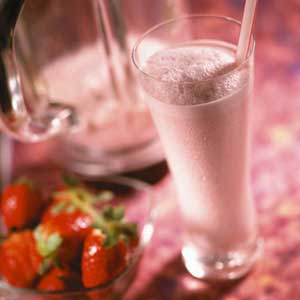Caregiving > Nutrition & Diet > Full-Liquid Diet
Full-liquid diets are designed for instances when the body can digest all liquids, but still can not tolerate solid food. Your doctor or dietitian may recommend this diet after surgery or if chewing and/or swallowing food is a problem. Because this diet includes most of the recommended food groups with the exception of meat, this diet can be followed for long periods of time when properly planned. Sometimes your doctor may also prescribe a commercial supplement or extra vitamins.
Examples of full-liquid foods include:
- All fruit juices, nectars

- Bouillon, broth
- Butter, cream, oil, margarine
- Carbonated beverages
- Cheese soup
- Coffee, tea
- Fresh or frozen plain yogurt
- Fruit drinks, fruit punch
- Honey, jelly, syrup
- Ice milk
- Liquid meal replacements
- Milk, all types
- Milkshakes
- Plain cornstarch pudding
- Plain gelatin desserts
- Potatoes pureed in soup
- Refined or strained cooked cereal
- Small amounts of strained meat in broth or gelatin
- Smooth ice cream
- Soft or baked custard
- Strained or blenderized soup
- Thin fruit purees
- Tomato juice
- Tomato puree for cream soup
- Vegetable juice
- Water
An example of a Full-Liquid Diet menu would be:
Breakfast
- 1 cup fruit juice
- 1 cup strained cereal
- 1 cup milk
- Coffee or tea* with sugar
Snack
- 1 cup fruit juice
Lunch
- 1 cup strained soup, (made with vegetable puree)
- 1 cup strained cereal
- ½ cup allowed dessert
- 1 cup fruit juice
- 1 cup milk or yogurt
- Coffee or tea* with sugar
Snack
- 1 cup milk or eggnog
Dinner
- 1 cup strained cream soup (with small amount of strained meat)
- 1 cup milk
- 1 cup strained cereal
- ½ cup allowed dessert
- 1 cup vegetable juice
- Coffee or tea* with sugar
Snack
- 1 cup milk or yogurt
* Your doctor may recommend decaffeinated coffee or tea.
Protein and calories can be added to a Full-Liquid Diet by:
- Adding nonfat dry milk to beverages and soups.
- Adding instant breakfast powder to milk, puddings, custards and milkshakes.
- Adding strained meats (such as those in baby food) to broths.
- Adding butter to hot cereals and soups.
- Including sugar or syrup in beverages.
- Using smooth ice cream in desserts and beverages.
- Using prepared breakfast mixes in milk or milkshakes.
Click the following links for:
- Full liquid recipes
- Soft food recipes
- Recipes for mesothelioma patients and caregivers
- Nutrition information for mesothelioma patients undergoing aggressive treatments
- Glossary of terms related to cancer nutrition.
Mesothelioma Aid Support Topics
Financial Planning for Cancer Patients
Free Information Packet on Mesothelioma
If you would like to receive a FREE information packet on mesothelioma**, or if you have a comment or question, please complete the following:
**(Packet includes information on treatment, clinical trials, cancer links, how to access legal and financial resources, and frequently asked legal questions with answers provided by Cooper, Hart, Leggiero & Whitehead, PLLC). By filling out the above form you consent to being contacted by Cooper, Hart, Leggiero & Whitehead regarding potentially retaining legal services.